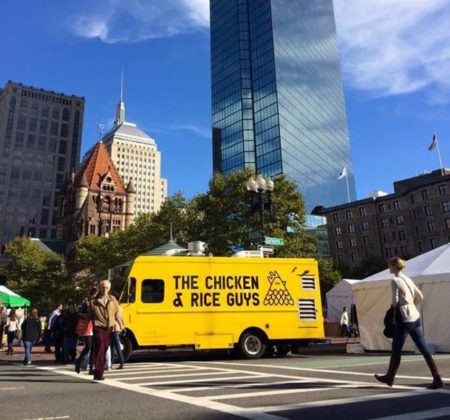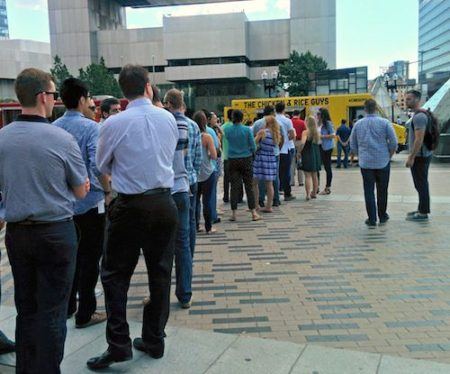How Safe Food Trucks Are?
E. coli outbreak closed Chicken & Rice Guys in Boston
 According to the Boston Globe the city of Boston received an anonymous complaint about customers getting sick after buying food from Chicken & Rice Guys trucks.
According to the Boston Globe the city of Boston received an anonymous complaint about customers getting sick after buying food from Chicken & Rice Guys trucks.
The Boston Health department confirmed 7 cases of E. coli food poisoning originating from the Allston location that supplies the food for the chain. The company has 5 trucks that rotate in the Boston area. They also have regular, brick and mortar, restaurants in Allison, Boston, and Medford. The Chicken & Rice Guys began the food truck business in 2012.
Fifteen of the chain customers were infected with E. coli O157:H7, with 10 of them requiring hospitalization. None of them were elderly or children, the typical sensitive population to E. coli infections. According to the Globe story Dr. Anita Barry, director of the Infectious Disease Bureau at the Boston Public Health Commission, said that none of those sickened had developed hemolytic uremic syndrome (HUS).

The Health Department closed the restaurants and food trucks during the investigation. Most of the cases had a connection to the Allison location. An investigation is being conducted by the Department of Public Health in Boston, in conjunction with health departments in Medford and Somerville, and the U.S. Centers for Disease Control and Prevention.
The Health Department of Boston is testing the food taken from the restaurants as well as stool samples from all its employees. It is not clear at this time whether the food caused the outbreak or the employees contaminated the food with their hands.
The company’s CEO Ian So, apologized to the customers on Facebook in a video in which he said: “First and foremost, I’m really sorry to everyone that got sick.” “If you know our team and dedication…it hurts a lot. Obviously we can do a better job.” He also said “we decided to voluntarily shutdown affected operations” Ian So also said that although the restaurants passed inspection they will continue to keep them closed until the reasons for the outbreak are determined.
The company hired a food safety consultant and an outside cleaning firm to “deep clean” all its restaurant locations and the food trucks.

The question: Is it safe to eat from a truck?
Food trucks have rapidly multiplied on Boston streets and plazas, with 75 gourmet-style restaurants on wheels now serving up any food imaginable, with cheap convenient food for the lunch crowd.
In Boston, 41 % of these trucks have been cited for food safety violations that can put their customers at risk of food poisoning, according to a Globe review of all inspection records.
It is generally more difficult to ensure the safety of meals from food trucks as compared to traditional restaurants. This is because trucks lack of the same infrastructure of brick and mortar restaurants. However, a study by the Institute of Justice released in 2014, Showed that food trucks and carts have similar or fewer number of violations as regular restaurants.
Contradicting this study was an investigation conducted by the California Environmental Health Specialists Network (EHS-Net). It determined that of the 95 mobile food trucks assessed, 94.73% exhibited at least one critical risk factor. The study demonstrated that mobile food trucks would benefit from similar inspection practices as regular restaurants. It concluded that these “restaurants on wheels” are difficult and time consuming to locate, creating a considerable resource drain to an already taxed inspection workforce. Most of the 57 California environmental health agencies surveyed in the study indicated that they conduct only one “scheduled” inspection per year. A reason for it the inability to locate food trucks due to limited resources.
Complying with health standards is tougher for food trucks than for traditional restaurants. However, one actually is more likely to get sick because an employee had bad hygiene, on a truck or in a restaurant. Filthy hands are a major reason for food contamination on food trucks and are a major suspect in the Chicken & Rice Guys case.
A lack of water supply and improper storage of food are the two main food safety challenges for food trucks. However, all these concerns do not seem to discourage truck patrons, judging from the long lines formed at lunch time.
